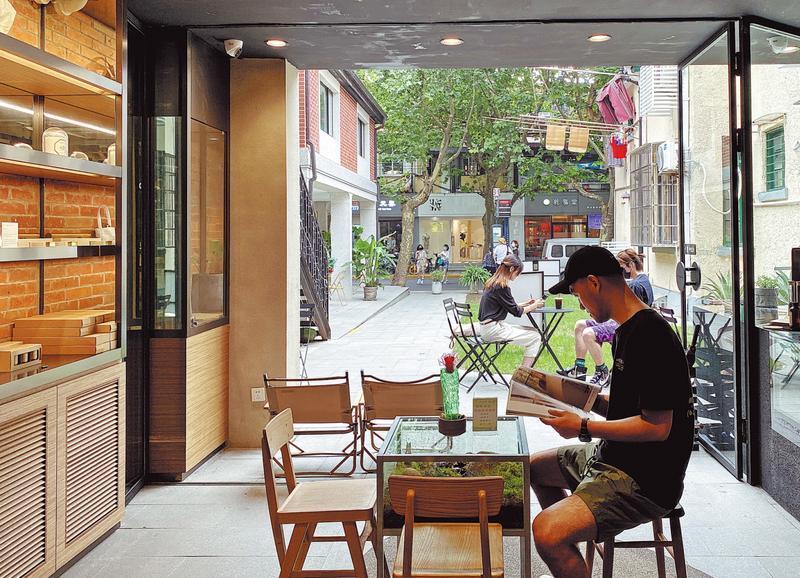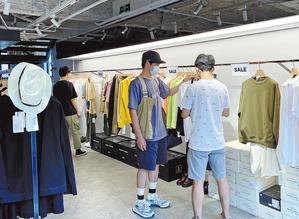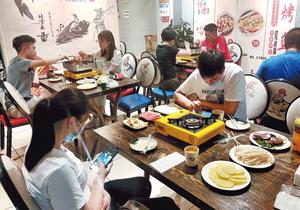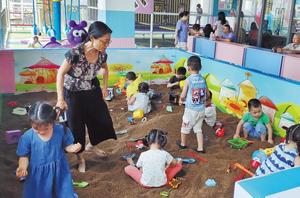Innovation key to surviving pandemic
 Customers take a break at Element in Shanghai, which sells clothing, shoes, handbags, perfume and household supplies. (PHOTO PROVIDED TO CHINA DAILY)
Customers take a break at Element in Shanghai, which sells clothing, shoes, handbags, perfume and household supplies. (PHOTO PROVIDED TO CHINA DAILY)
The impact of the COVID-19 pandemic has been huge, especially on brick-and-mortar businesses in many industries as customers stayed home during lockdowns.
The catering, clothing, training and entertainment industries are just a few that have been badly affected.
However, despite months of slim profits and even losses, business owners remain optimistic about the Chinese market's consumption potential.
I never thought about closing the stores. There will always be challenges if you run your own business, such as lack of cash flow. You need to adjust in the face of such changes
Zhu Yide, shop owner in Shanghai
Three of them have told of their confusion and anxiety in such difficult times. They also outlined measures they have taken to revive their businesses after the pandemic, offering a glimpse of the situation facing the country's private small and microbusinesses.
One of the owners, Zhu Yide, decided to start his own business in 2016, with the aim of standing out from the competition.
He opened his store, which sells clothing, shoes, handbags, perfume and household supplies, in a 90-year-old, two-story, Western-style villa in a tranquil alleyway in downtown Shanghai.
The business was named Element, with Zhu aiming to sell items essential for a fashionable lifestyle.
But in the first half of this year, the store experienced its poorest performance. Since closing in late January for the Spring Festival holiday, it saw no revenue until it reopened in May, three months after offline businesses were allowed to resume trading in Shanghai.
 Clothing is selected by customers at Element. (PHOTO PROVIDED TO CHINA DAILY)
Clothing is selected by customers at Element. (PHOTO PROVIDED TO CHINA DAILY)
Zhu knew that most of his employees could not return to the city due to travel restrictions, and that because of its secluded location, the store faced a hard time trying to woo customers back.
In September, he opened a second store in Shanghai, located in a three-story building on a busy commercial street.
The catering market in China is huge, but also very competitive. You have to develop your own ideas and products to stand out
Zhang Qiang, Beijing restaurant owner
The first floor is occupied by a cafe and flower shop, the latest fashions are sold on the second, while the top floor is devoted to outdoor sports apparel and equipment, toys and craftwork.
However, Zhu has also been disappointed by this business, which is surrounded by several office buildings and can be reached by three subway lines. Since it reopened on Feb 10, the store has seen fewer than 10 customers a day, many of them just grabbing a cup of coffee in the lunch break before leaving.
"One reason for this is that more workers have been bringing their lunch to the office, making them less inclined to go out. Subway services were also reduced, and the number of passengers restricted," Zhu said.
He decided to offer discounts to attract clients, with a cup of coffee selling for about half the usual price, but despite his efforts, revenue in February was only about 10 percent of that for the same month last year.
Monthly revenue used to be 500,000 yuan to 600,000 yuan (US$71,400 to US$85,680). In March, it fell by 50 percent year-on-year and has since returned to about 70 percent of the usual level.
"Profit shrank a lot, but we believed this would only be short-term, and we have not seen a loss," Zhu said. He attributed this to a free rental period of more than 40 days in January and February offered to businesses by the landlord, a real estate operator.
This helped Zhu save more than 100,000 yuan. The working hours for his 20 employees were cut, but their wages were not reduced.
"I never thought about closing the stores. There will always be challenges if you run your own business, such as lack of cash flow. You need to adjust in the face of such changes," he said.
The half-price offer on all coffee continued until March, after which the store offered reductions on different types of the beverage every day, advertising them by placing posters on the doors to attract passerby.
Last month, Element joined street markets in the Bund organized by the local authorities. More than 100 vendors set up stalls free of charge as part of efforts to promote the street and night economies to boost consumption.
Early this month, the company took part in ISPO Shanghai 2020, a sports industry and consumption convention, at the Shanghai New International Expo Center, where Zhu said he met old business partners and made new friends.
He is also talking with clothing, wine and auto brands about joint cooperation in the second half of this year.
 Customers return to Zhang Qiang's roast fish restaurant in Beijing. (PHOTO PROVIDED TO CHINA DAILY)
Customers return to Zhang Qiang's roast fish restaurant in Beijing. (PHOTO PROVIDED TO CHINA DAILY)
In general, Zhu is positive about the future. "The retail sector has long-term potential in the Chinese market if you stick to different products, environments and experiences," he said.
He is attempting to target a wide customer base, including white-collar workers, young people and adults with children, by changing products and store decorations every week to provide a sense of novelty.
On July 6, Zhu said on his WeChat Moments account, "Our book business is ready to take off."
Fish restaurant
To remain in business, many eateries began offering takeout services during the pandemic, but for Zhang Qiang, who runs a roast fish restaurant in Beijing, this did not appear to be a good idea.
When you start out, you think you’re special, but you soon find that success is only earned by a few, and that your own is not even worth a mention. You expect to experience problems and difficulties, but there are so many of them
Jiang Jun, children’s playground owner in Chengdu
At Zhang's Lame'aini restaurant in Chaoyang district, diners spend an hour or two chatting beside an oblong pot containing fish boiling over a fire. Vegetables, and possibly noodles, are added later.
"The secret of enjoying roast fish is to eat it immediately after it is cooked, and to share the experience with family and friends in a relaxed atmosphere," Zhang said. "If you eat it from a doggy box at home, it will feel totally different."
Zhang founded the restaurant in the Caochangdi art area in 2018. Half the customers are white-collar workers in the area.
During peak of the pandemic, many workers did not return to the area and the gates were closed to outsiders. Lame'aini, which usually resumed business for the last two days of the Spring Festival holiday, closed from late January until March.
"For two months, we had no customers and no income, but had to pay the rent. All our food perished," Zhang said, adding that most restaurants stocked up before the holiday in case wholesale markets selling farm produce were closed.
In early May, dine-in services resumed in the area. Before this, Zhang had to rely on takeouts, which he said did not work out well. He received only three to four orders a day, bringing in a few hundred yuan, compared with 3,000 yuan to 5,000 yuan in normal times.
Income gradually improved to 1,000 yuan to 2,000 yuan a day in May and early last month, until a new cluster of infections was reported in Beijing on June 11, resulting in Zhang's earnings plummeting again.
Before starting his own business, he worked for several hotels in the capital for eight years after graduating from a culinary school. His first restaurant in the city went bankrupt, and he is now pinning his hopes on roast fish.
"However, I don't think this business will survive if it keeps losing money," he said.
Occupying 70 square meters, Lame'aini has six tables and can accommodate a maximum of 50 diners.
Disinfection and temperature checks are carried out every day. The plates and chopsticks have been replaced by plastic ones to ease customers' concerns. Once every week or two, workers from the local authority arrive to see if the business is following pandemic control instructions.
The rent, which is Zhang's biggest outlay, is 120,000 yuan to 130,000 yuan a year. Late last month, food prices rose by up to 10 percent, with supply shortages occasionally reported, he said. In addition to himself and his wife, he employs a worker who earns 40,000 yuan to 50,000 yuan annually.
"The losses are still tolerable, but if they worsen, we will have to close the business or transfer it," he said.
"The catering market in China is huge, but also very competitive. You have to develop your own ideas and products to stand out."
He said business gradually recovered this month, as the outbreak in the city was contained.
 Children have fun at the newly opened playground Mengka Children's Paradise in Chengdu, Sichuan province. (PHOTO PROVIDED TO CHINA DAILY)
Children have fun at the newly opened playground Mengka Children's Paradise in Chengdu, Sichuan province. (PHOTO PROVIDED TO CHINA DAILY)
Children's playgrounds
Asked for his advice on starting a business, Jiang Jun has a straightforward reply. "I suggest you avoid doing this if you can feed yourself on what you earn already," he said.
A former manager at a finance company and now the owner of two indoor children's playgrounds in Chengdu, capital of Sichuan province, Jiang has learned a bitter lesson.
Last month, revenue from his suburban rock-climbing playground, which has been operating for two years, fell by 20 percent to 30 percent year-on-year because of the pandemic.
His newly opened playground, Mengka Children's Paradise, has toys for preschool children and is near the city center, but revenue from the opening day on June 6 to June 30 was similar to that earned in a single day at his first playground at the start of last month.
"I don't think the impact of the pandemic on the children's entertainment industry will be fatal for businesses, but more operators have begun to sell secondhand equipment or have announced they are pulling out of the market," Jiang said, citing information from peer WeChat groups.
Before the contagion emerged, he signed a contract for the new playground with a shopping mall and paid six months' rent of more than 100,000 yuan. He also spent about 400,000 yuan on decoration and renovation work, but knows he will be unable to recover his costs this year.
Jiang has tried many ways to boost business, including discounts and marketing activities, but these have had little effect.
"Before the pandemic, people often paid for products or services directly when they visited a shopping mall. Now, they think hard about whether such spending is really necessary," he said.
 Children have fun at the newly opened playground Mengka Children's Paradise in Chengdu, Sichuan province. (PHOTO PROVIDED TO CHINA DAILY)
Children have fun at the newly opened playground Mengka Children's Paradise in Chengdu, Sichuan province. (PHOTO PROVIDED TO CHINA DAILY)
"Many parents have had their salaries cut and some have even lost their jobs, so they are not nearly as willing to pay for children's entertainment. Instead, they are looking to invest in their kids' education.
"Furthermore, some people are avoiding crowded public areas," he said, adding that the shopping mall has told vendors to limit the number of customers to 20 as part of pandemic control measures.
Jiang's first playground, which occupies about 140 square meters, is aimed at children ages 4 to 12 who want to try indoor rock climbing with the help of adult coaches. Before the pandemic, it catered to a maximum of 200 children a day during holidays, with admission costing 58 yuan.
The new 600-square-meter business has a 200-yuan membership promotion covering six visits.
Jiang plans to close the older business when the contract expires in January, as he fears further rent rises, which since 2018 have grown from 8,000 yuan to 13,000 yuan a month. He is also worried about declining revenue.
He plans to continue with the new business, as he has sunk nearly all the profit from the old one into it, but has noticed a drop in the number of potential customers and more stores closing.
"It's sad to see this, because Chengdu is a city with a vibrant retail trade. We need to figure out ways to open up the market and stimulate consumption," he said, adding that he is in negotiations with an English-language training institute in an attempt to attract more customers.
This initiative involves the institute staging courses at Jiang's business twice a week, with instruction fees and client resources shared. The playground will also organize birthday parties for young students once a month, with friends invited.
When he left the financial sector, Jiang was leading an 80-strong team, but he said he decided to make a move because he didn't want to regret not starting his own business.
"When you start out, you think you're special, but you soon find that success is only earned by a few, and that your own is not even worth a mention. You expect to experience problems and difficulties, but there are so many of them. At the end of the day, you have to admit that you're just an ordinary person," he said.
"Some of my former colleagues now earn more than 100,000 yuan a month and never have to experience such ups and downs."
Jiang expects his business to recover in the second half of this year, when nearby schools, supermarkets and a community vaccination station open. He also anticipates making ends meet next year if the pandemic is over.
"If it doesn't work well, maybe I'll try a smaller business or invest in other people's," he said.
Asked if he had considered returning to work for a company, he said firmly, "No way."


